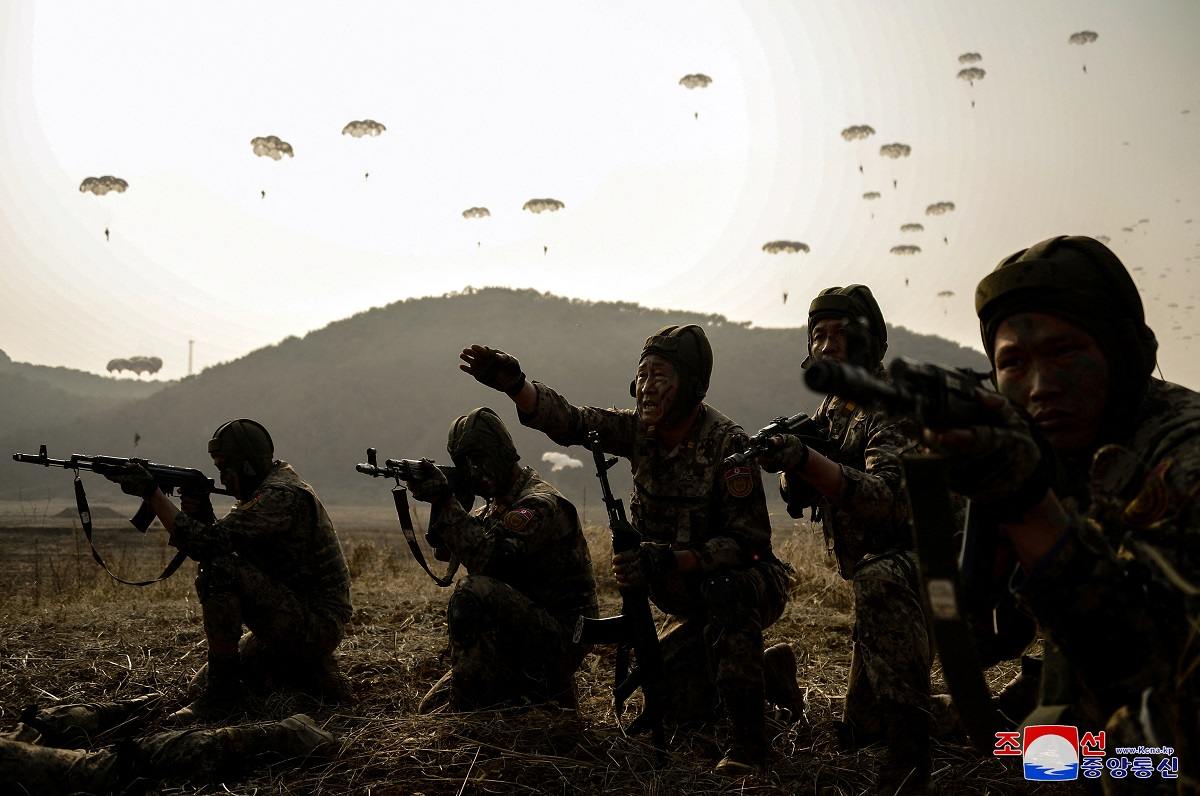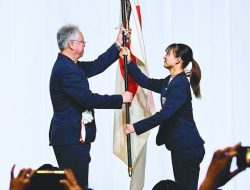
Soldiers participate in a demonstration during the training of the Korean People’s Army’s air and amphibious combat units, in this picture released on March 16, 2024, by the Korean Central News Agency.
13:00 JST, October 29, 2024
BRUSSELS – NATO Secretary General Mark Rutte said Monday that North Korean soldiers have been deployed to Kursk, the Russian border region where Ukrainian forces seized territory in a surprise attack over the summer, in what could be a “dangerous expansion” of the war in Ukraine.
The North Korean deployment marks an escalation in Pyongyang’s “growing involvement” in Russia’s war, said Rutte, who became the NATO military alliance’s top official this month. The assignment means that North Korean troops could enter into direct combat with Ukrainian forces and significantly exacerbate Pyongyang’s long-standing tensions with the West.
“Today I can confirm that North Korean troops have been sent to Russia and that North Korean military units have been deployed to the Kursk region,” Rutte told reporters, without saying how many forces might be there.
The Pentagon appeared to concur with key parts of Rutte’s assessment, saying later Monday that it now assesses that up to 10,000 North Korean soldiers have been sent to eastern Russia for military training ahead of a likely effort to augment Russian forces.
Sabrina Singh, a Pentagon spokeswoman, told reporters that U.S. defense officials had seen reports over the weekend indicating that North Korean soldiers “have started arriving in western Russia,” closer to Ukraine.
“We are increasingly concerned that Russia intends to use these soldiers in combat or to support combat operations against Ukrainian forces in Russia’s Kursk [region] near the border with Ukraine,” Singh said.
Ukrainian forces launched a surprise assault into Kursk in August, capturing nearly 500 square miles of terrain and hundreds of Russian prisoners of war, Ukrainian military officials have said. Ukrainian troops have managed to maintain control of about half of that land, following Russian counterattacks.
Singh, asked if North Korean troops already were in Kursk, stopped short of confirming that advance, saying that the Pentagon assesses they are “likely moving in that direction.” Singh said the Defense Department assesses that the number of North Korean troops in Russia could continue to rise, attributing the move to Russian President Vladimir Putin’s “desperation.”
U.S. officials disclosed freshly declassified intelligence on the North Korean deployment last week, saying initially that they believed at least 3,000 soldiers had deployed to eastern Russia for training. Defense Secretary Lloyd Austin said then that if North Korean forces joined the war, it would be a “very, very serious issue” that would have impacts in both Europe and the Pacific. The U.S. announcement followed similar intelligence disclosures from Kyiv and Seoul.
“According to the information of the concerned population of the Kursk region, more than 3,000 mercenaries from the Democratic People’s Republic of Korea have begun coordination exercises on the ground,” the National Resistance Center, a branch of Ukraine’s special operations forces, said in a new statement. “Soldiers of the Kim Jong-un regime are being trained at several training grounds, with personnel mainly transported at night. Along with them, embassy staff from the communist country have arrived at the training sites, serving as translators and overseeing the mercenaries.”
Rutte’s comments came after South Korean intelligence and military officials visited NATO headquarters on Monday to brief the defensive alliance, as well as officials from Australia, Japan and New Zealand. He said NATO countries also shared their intelligence assessments.
“Pyongyang has already supplied Russia with millions of rounds of ammunition and ballistic missiles that are fueling a major conflict in the heart of Europe,” he added. In turn, Putin was providing North Korea with military technology and “other support to circumvent international sanctions,” he said.
Putin appeared to obliquely acknowledge the presence of North Korean troops in Russia last week and cited the article on mutual defense in the two countries’ new security treaty.
On Monday, Russian Foreign Minister Sergei Lavrov said condemnations from Western leaders about Russian-North Korean cooperation were an “attempt to retroactively justify” their own military support to Ukraine.
“The treaty is not secret. It is open,” he said, adding that “it implies, among other things, assisting each other in case one of the countries participating in the treaty is militarily attacked.”
A former Kremlin official, who is still close to government circles, said the North Korean deployment in Kursk was “an act of revenge after what the Kremlin perceives as an escalation in Kursk” and the decision by Kyiv’s Western allies to allow some strikes inside Russia. “This is another step on the escalation scale.”
The former official, speaking on the condition of anonymity to freely discuss sensitive matters, said it’s “cheaper and politically simpler” for the Kremlin to deploy North Korean forces.
Putin has so far avoided another major mobilization of personnel in Russia for the war that could have a negative impact on the popularity of the government.
For Kyiv, the move could further complicate an already tense battlefield, where Ukrainian forces have suffered new setbacks – including ceding up to half of the territory Kyiv seized during its cross-border offensive into Kursk in the summer, analysts say.
Ukrainian officials had hailed the Kursk attack as a success that could give them leverage, but its results have been unclear, and recent Russian counterattacks have cast doubt on how long Kyiv will be able to keep holding ground.
A senior Ukrainian security official said “at least a few thousand” North Korean troops were being sent to Kursk. A second Ukrainian security official, speaking on the condition of anonymity to discuss a sensitive matter, said North Korea’s role now meant “the Russians will have an additional source of human power.”
“It means they will have less pressure on society,” the official said. “It’s really bad.”
The presence of North Korean troops in Kursk could help Moscow retake more of the Russian region. Officials in Kyiv have said the North Korean reinforcements could free up Russian units to focus on the battlefield in eastern Ukraine, where Ukrainian forces are already on the back foot.
Ukrainian President Volodymyr Zelensky and other officials have used Pyongyang’s support for Russia as an opportunity to call for more action from Kyiv’s Western allies.
In particular, the Ukrainian president has called for permission to use U.S.-provided longer-range missiles to strike deeper inside Russia and for a NATO invitation for Ukraine – asks that Washington has so far rebuffed.
“Ukraine will be forced to actually fight against North Korea in Europe,” he said in an address over the weekend, urging allies to make “stronger decisions.”
Top Articles in News Services
-

Survey Shows False Election Info Perceived as True
-

Hong Kong Ex-Publisher Jimmy Lai’s Sentence Raises International Outcry as China Defends It
-

Japan’s Nikkei Stock Average Touches 58,000 as Yen, Jgbs Rally on Election Fallout (UPDATE 1)
-

Japan’s Nikkei Stock Average Falls as US-Iran Tensions Unsettle Investors (UPDATE 1)
-

Trump Names Former Federal Reserve Governor Warsh as the Next Fed Chair, Replacing Powell
JN ACCESS RANKING
-

Producer Behind Pop Group XG Arrested for Cocaine Possession
-

Japan PM Takaichi’s Cabinet Resigns en Masse
-

Man Infected with Measles Reportedly Dined at Restaurant in Tokyo Station
-

Israeli Ambassador to Japan Speaks about Japan’s Role in the Reconstruction of Gaza
-

Videos Plagiarized, Reposted with False Subtitles Claiming ‘Ryukyu Belongs to China’; Anti-China False Information Also Posted in Japan























